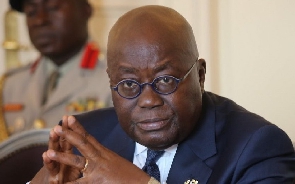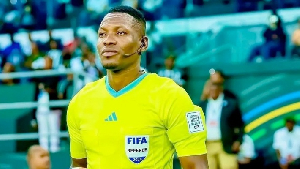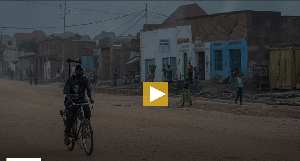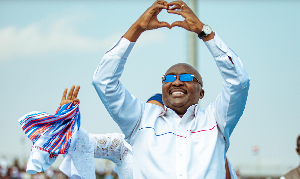By Kwame Okoampa-Ahoofe, Jr., Ph.D.
On June 20, 2009, an interesting news feature appeared on a website called Ghanascope.net. The news feature, captioned “How Nigeria Funded NDC in the 2008 Election,” detailed how the governor of Nigeria’s Rivers State, Mr. Rotimi Amaechi, allegedly funneled an estimated amount of $ 3.5 million into the electioneering campaign chest of Ghana’s ruling National Democratic Congress (NDC). This bit of outrageous information is only now being made public because Gov. Amaechi is reported to be currently under investigation by Nigeria’s Economic and Financial Crimes Commission (EFCC), having been charged with the flagrant diversion of huge sums of money officially earmarked for the development of Rivers State.
The report also indicated that Gov. Amaechi and several of his peers, meaning other state governors and highly placed public officials, have “devised a new [quite sophisticated] strategy of investing loots [creamed off the Nigerian taxpayer] in neighboring [West African] countries and [that] Ghana[,] with its seemingly stable economy[,] has become a favored destination.” The preceding, in simple language, means that Ghana has either wittingly or unwittingly been in receipt of huge wads of stolen cash. Ordinarily, this ought not to raise eyebrows since the practice is age-old and global. What with Swiss banking institutions regularly receiving billions of dollars in cash deposits from Third-World dictators and their racketeering cronies? Even Ghana’s first president, a much-touted “honest leader,” by his most ardent and staunch supporters, of course, is alleged to have deposited about £ 5,000.00 (Five-Thousand Pound Sterling) in the name of one of his sons in a Swiss bank. The latter became widely known in the aftermath of Nkrumah’s landmark overthrow in February 1966. And while in today’s inflation-adjusted terms it was quite a decent amount, even by conservative standards of the 1960s, still £ 5,000.00 was chum change. For even leaders of far less endowed Third-World countries had siphoned tens of thousands of hard currency notes belonging to the ordinary taxpayer into foreign banking institutions for personal use.
One interesting dimension of this story, however, is the predictable appearance on the list of illegal loot recipients of Chief Jeremiah Dzelukope, founding patriarch of the so-called National Democratic Congress. We note the “predictable’ appearance of his name on the list of illegal public loot recipients, because this is not the very first time that Dzelukope Jeremiah has been accused of collaborating with his Nigerian peers in order to bleed that country’s taxpayer raw to the bone. For instance, during the 1990s, Chief Dzelukope was widely alleged to have taken payolas in the staggering amount of $ 5 million from the late Gen. Sani Abacha, in order to launch a doomed-from-the-start public relations campaign on behalf of the latter. And true to form, and to the acute and unpardonable embarrassment of every well-meaning Ghanaian citizen, Chief Dzelukope mounted the podium before an august forum of the United Nations General Assembly and loudly and shamelessly declared that, indeed, Gen. Sani Abacha was the best leader in postcolonial Nigerian history.
Still, what makes the foregoing allegation worthy of the critical attention of the Ghanaian public and, perhaps, even necessitates a comprehensive investigation, now that Nigeria’s Economic and Financial Crimes Commission appears to have arrived at a similar conclusion – that, indeed, Chief Dzelukope has been in questionable and untenable business dealings with Nigerian politicians with the overriding objective of fleecing the latter’s people for personal gain – is the imperative need to put paid to the perennial fingering of Chief Dzelukope and the latter’s chronically vehement denials and protestations of the same.
And here, also, we hasten to observe that back in the days when Chief Dzelukope doubled as Gen. Abacha’s “spin-meister,” Nigeria’s Nobel Literature Prize-laureate, Prof. Wole Soyinka, added his voice and considerable weight to that of those on the side of “restitutive justice” by publicly and vehemently calling on Chief Dzelukope to return his Abacha-proffered loot. We also vividly recall Chief Dzelukope cavalierly parrying off the allegation and even furiously characterizing it as a patent absurdity of the highest order.
Still, one cannot lightly dismiss the foregoing allegations, in view of plausible suspicions raised, in recent years, regarding the apparently inordinate frequency with which Chief Dzelukope has played guest to many a big-time Nigerian politician or statutory institution, under the guise of lecture invitations.
Then also, in the heated lead-up to Election 2008, the longtime personal assistant to Chief Dzelukope was abruptly relieved of his largely thankless duties, under what many in the mainstream Ghanaian media then characterized as “a cloud of suspicion.” We would soon learn that the “causative straw,” as it were, had to do with the fired ace toady’s inexplicable, albeit quite admirable, attempt to belatedly stand up to his master on the question of who was to serve as kitty conduit or paymaster and shot-caller for Oguaa Kofi, now Ghana’s substantive absolute chieftain.
And so, yes, just as there is no smoke without the presence of fire underneath, somewhere, the Nigeria nexus of Chief Dzelukope is one that critically begs for scrutiny. And on the latter score, we solemnly call on both the Ghanaian parliament and the country’s Bureau of National Investigations (BNI) to live up to their names and functions, for Ghana’s fledgling, albeit salutary, democratic culture is too significant to be allowed to be unconscionably hijacked by the inordinate greed and megalomania of one man and his equally unconscionable minions.
What we also need to highlight, and that which has been the overriding motivation for the composition of this article, is the fact that being systematically, perennially and deliberately in receipt of “stolen goods” never made for good neighborliness. In view of the preceding paragraph, we must also point out that the intention here was never to sound hostile or even belligerent towards our traditionally genial and soft-fisted “gentle-giant” neighbor to the East. What largely provoked the caption of this article was a rather sarcastically and offensively composed sentence from the aforementioned exposé which read as follows: “While the world celebrates Ghana as a beckon [beacon?] of free and fair democracy in Africa, there is no mention of the country, Nigeria, that provides the money that produces the miracles of Ghana.”
Indeed, it would be more than worthy of the enlightenment of our “gentle-giant” eastern neighbors to observe an all-too-pedestrian fact that Ghana’s democratic culture is deeply rooted in the ultimate sacrifice of the immortalized Dr. Joseph (Kwame Kyeretwie) Boakye-Danquah, unarguably Ghana’s greatest champion of democratic governance in the twentieth century and the undisputed Doyen of Gold Coast and Ghanaian politics. It may also be worthwhile for our eastern neighbors to avail themselves of a desk copy of the eulogy classically composed by Dr. Nnamdi Azikiwe to mark the apocalyptic occasion of the passing of continental Africa’s foremost constitutional lawyer, philosopher and nationalist thinker of the twentieth century, in the Condemned Cell of the Nsawam Medium-Security Prison on February 4, 1965.
And here also must be highlighted the fact that Dr. Danquah died solely because of his uncompromising stance against the fascist and pseudo-socialist dictatorship of the Nkrumah-led Convention People’s Party. In short, if Nigeria’s contribution to Ghana’s Election 2008 squarely hinges on Gov. Amaechi’s allegedly illegal funding of the winner, the so-called National Democratic Congress (NDC), then what Nigeria actually achieved, by way of global recognition, was to have seriously undermined Ghana’s sovereignty and the country’s onward march for democracy as a paragon of modern African civilization, an achievement for which morally and politically regressive implications no well-meaning continental African denizen ought to be grateful.
*Kwame Okoampa-Ahoofe, Jr., Ph.D., is Associate Professor of English, Journalism and Creative Writing at Nassau Community College of the State University of New York, Garden City. He is the author of 20 books, including “Sounds of Sirens: Essays in African Politics and Culture” (iUniverse.com, 2004). E-mail: okoampaahoofe@aol.com.
Opinions of Friday, 26 June 2009
Columnist: Okoampa-Ahoofe, Kwame














